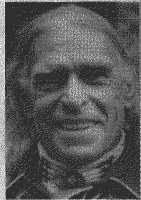
Boston Globe photo
MASHPEE - John Peters, supreme medicine man of the Mashpee Wampanoag Indian tribe and the first and only executive director of the Massachusetts Commission on Indian Affairs, died Monday after a long illness. He was 67.
As supreme medicine man, Mr. Peters, whose traditional name was Slow Turtle, or Cjegktoonuppa in Wampanoag, performed traditional services when tribal members died or were given their Indian names, and at the opening of tribal powwows and social events.
He was invited by countries from Scandinavia to Japan to meet with spiritual people there, and performed traditional Indian ceremonies in Hiroshima and Nagasaki in memory of atomic bomb victims.
"He had a lot of wisdom," his brother, Russell Peters, president of the Mashpee Wampanoag Tribal Council, told the Cape Cod Times of Hyannis.
"I wouldn't say that he was a mediator, but he was able to get people to think about issues that were important to them, that shape their lives. He was well-respected and well-known throughout the country," he said.
"He was very understanding of the Indian way, and he was able to sit down and listen to the problems of the Indian tribes of Massachusetts," said Beverly Wright, chairwoman of the Wampanoag tribe at Gay Head on Martha's Vineyard.
"It will be a great loss, especially to the Mashpee people, but also to all Native Americans in Massachusetts," she said.
Mr. Peters was director of the state Commission on Indian Affairs since it was created in 1974, serving as the liaison between the Legislature and the state's four tribes.
He pushed for laws that affected Indians throughout the country, while fighting legislators who wanted to end financing for the agency.
He is credited with state legislation that became the model for the federal Native American Graves Repatriation Act, which requires museums and other institutions to return skeletal remains and cultural artifacts to Indian tribes.
"Ironically, it excluded (the Mashpee Wampanoags) because we're not federally recognized," said Russell Peters.
John Peters also was a leader in creating the federal American Religious Freedom Act, and also the Indian Child Welfare Act of 1978, which requires that all orphaned Native American children and those taken from their homes be placed in Indian homes or places that keep them in touch with their culture.
The commission also administered a state college scholarship program for Indians.
Mr. Peters also said prayers for other tribes, including the Mashantucket Pequots in Connecticut.
As his brother Russell tells the story, when the Pequots were going to launch a ferry, the governor of Connecticut planned to attend, and asked John Peters to offer a prayer to ensure a good day.
"What does (the governor) want?" John Peters asked the Pequot leaders. "Every day is a good day. You need rain; you need sun, wind to blow things around. Every day is a good day."